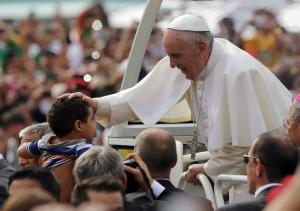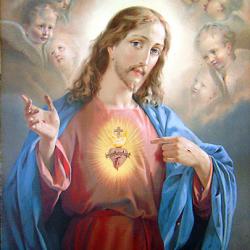Jesus gave Peter the keys of the kingdom which include the authority and responsibility of serving and teaching the faithful sheep of his kingdom, on whose faces is imprinted a divine likeness, what it means to be a Christian. He helps us to ask ourselves where we are in our story of love with God. He helps render the passion of Our Redeemer to made present in our midst.
The same papal mission of universal paternity entrusted to Peter has been passed down through the centuries up to our present time in which Pope Francis reigns as supreme pontiff in 2024. The world has changed a lot since the time of Peter. It has changed a lot since a century ago. But what hasn’t changed is the universal timeless message of faith, hope, and love that has been proclaimed throughout its history. Looking back just a 100 ago, we can find the same spirit of joy and insight spoken by the pope then as we can today. So looking back to 1924 and every 24 years up to the present I present to you what wisdom the Popes have given us to think, ponder and reflect on. As well as a quick look into the world in which those words were spoken.
100 Years Ago
1924
Love for the Pope
Another spectacle, which has been staged not only in France but throughout the world, has come to bear witness to the faith of all Catholics and has filled Our hearts with much sweetness. We wish to speak of the second anniversary of Our accession to the Pontificate, which all peoples have commemorated with singular devotion, and of the feast celebrated in different parts of the world and which is usually affectionately called “the Pope’s Day“: these solemnities have been attended not only by the masses of the people, but also by the most notable personalities of the city and also by the supreme public authorities. who have testified in various ways to their attachment to Us. For all this, and for so many obeisances, We thank the goodness of God and the affection of men, knowing well that these honors and praises are not so much addressed to Our littleness as to the Prince of Shepherds, of whom God, in spite of Our scanty merits, has appointed Us vicar with the task of exercising His powers on earth.

That this universal paternity entrusted by God to his Vicar on earth should be instinctively recognized by almost everyone is certainly something important, a supremely magnificent fact. But this very office of fatherhood would be an abundant source of affliction and distress for the Roman Pontiff if the faithful were not found who, fully aware of this fatherhood as belonging to the same house as the Father, would provide the resources capable of succoring the miseries of the unfortunate. For there are Our children scattered throughout the earth who, favored more widely by God’s providence, love to help their neediest brethren through our common Father. Deeply touched by this generosity, We express Our gratitude to these collaborators and associates of Our beneficence, and consider the mercy practiced on those children of Ours as if it were directed to Us.
The World Around the Pope
Notable Song of the Year
Notable Events of the Year
- January 25 – The first Winter Olympics, the 1924 Winter Olympics open in Chamonix, in the French Alps.
- April 1 – Adolf Hitler is sentenced to 5 years in Landsberg Prison in Germany for his participation in the 1923 Beer Hall Putsch (he serves less than 9 months).
- April 16 – American media company Metro-Goldwyn-Mayer (MGM) is founded in Los Angeles through the merger of Metro Pictures, Goldwyn Pictures, and Louis B. Mayer Pictures.
- May 4 – The 1924 Summer Olympics opening ceremonies are held in Paris, France.
- May 10 – In the United States, J. Edgar Hoover is appointed head of the Federal Bureau of Investigation.
- May 26 – Harry Grindell Matthews attempts to demonstrate his “death ray” to the War Office in the United Kingdom.
- June 8 – George Mallory and Andrew Irvine are last seen “going strong for the top” of Mount Everest by teammate Noel Odell at 12:50 P.M. The two mountaineers are never seen alive again.
- December 30 – American astronomer Edwin Hubble announces that Andromeda, previously believed to be a nebula, is actually another galaxy, and that the Milky Way is only one of many such galaxies in the universe.
Notable Books Published
24 years Later
1948
War in the Middle East
- The passion of Our Redeemer, rendered present, as it were to us during these days of Holy Week, makes the minds of Christians turn with deepest reverence to that land which Divine Providence willed to be the cherished home-country of the Word Incarnate, and in which Christ Jesus lived His earthly life, shed His blood and died.
- Yet at the present time, as We recall the memory of those Holy Places with more ardent devotion, Our heart is full to overflowing with keenest anxiety because of the difficulty and uncertainty of the situation which there prevails.
- During this past year, We have urged you insistently, Venerable Brethren, in successive letters, that all should join in public prayer to implore the cessation of hostilities which have brought destruction and death in that land, and settlement of the dispute on principles of justice, which would fully safeguard the freedom of Catholics and at the same time provide guarantees for the safety of those most Holy Places.
- And now that hostilities have ended, or at least have been suspended after the recent truce, We offer Our most sincere and heartfelt thanks to God and voice Our emphatic approval of the labor of those whose noble efforts have contributed towards the re-establishment of peace.
- But although the actual fighting is over, tranquillity or order in Palestine is still very far from having been restored. For We are still receiving complaints from those who have every right to deplore the profanation of sacred buildings, images, charitable institutions, as well as the destruction of peaceful homes of religious communities. Piteous appeals still reach Us from numerous refugees, of every age and condition, who have been forced by the disastrous war to emigrate and even live in exile in concentration camps, the prey to destitution, contagious disease and perils of every sort.
Redemptoris Nostri Cruciatus (April 15, 1949) | PIUS XII (vatican.va)
Notable Song of the Year
Notable Events of the Year
- January 30
- Assassination of Mahatma Gandhi: Indian pacifist and leader Mahatma Gandhi is shot by Nathuram Godse in New Delhi.
- The 1948 Winter Olympics open in St Moritz, Switzerland.
- April 1 – Physicists Ralph Asher Alpher and George Gamow publish the Alpher–Bethe–Gamow paper, about the Big Bang.
- April 7– The World Health Organization is established by the United Nations.
- April 19 -The American Broadcasting Company (otherwise known as ABC) begins television services, on WFIL-TV in Philadelphia (later WPVI-TV).
- July 29 – The 1948 Summer Olympics begin in London, the first since the 1936 Summer Olympics in Berlin.
- November 2 – 1948 United States presidential election: Democratic incumbent Harry S. Truman defeats Republican Thomas E. Dewey, “Dixiecrat” Strom Thurmond and Progressive party candidate Henry A. Wallace.
Notable Books Published
- November 13 – Alice’s Adventures Under Ground, the original manuscript of Lewis Carroll‘s Alice’s Adventures in Wonderland, bought by a group of American Anglophiles in 1946, is presented by Luther H. Evans (Librarian of Congress) to the British Museum Library.
- The 20th and last edition of the Index Librorum Prohibitorum is published by the Holy See.
- “The Lottery” (short story) by Shirley Jackson
Notable Films Released
- Abbott and Costello Meet Frankenstein, starring Bud Abbott and Lou Costello
- Joan of Arc, starring Ingrid Bergman
- The Luck of the Irish, starring Tyrone Power and Anne Baxter
Notable Arrivals and Departures
- January 30
- Mahatma Gandhi, Leader of Indian independence movement, (assassinated) (b. 1869)
- Orville Wright, American co-inventor of the airplane (b. 1871)
- August 16 – Babe Ruth, American baseball player (New York Yankees), MLB Hall of Fame member (b. 1895)
24 Years Later
1972
Sympathy for the Worker
The Church has sympathy for the worker, first of all, because she sees and proclaims his dignity as a man, as a brother equal to every other man, as an inviolable person on whose face is imprinted a divine likeness. And this is all the more so (mind you: not much less!) as the need, the weakness, the suffering, the offense, the anxiety for habilitation and liberation are more marked on this face. Toil, poverty, insecurity, exploitation, and even some possible inferiority are titles for the sympathy of the Church.
And to the many other reasons which give rise in the heart of the Church to this sympathy for the innumerable crowd of men who sweat, suffer, and today wait and demand because of work, we add these two at the end, which all sum up; first: Christ too was a man of manual labor; he was subjected to toil in the school of Joseph, he was called “the son of the blacksmith” (Mark 6:3), he was your colleague, Workers number one and number last, because he gave his life, his blood, for all to save. And secondly, it is Christ’s own cry that still passes through the ages and over the world: “Come to me, all you who labour and are heavy laden, and I will sustain you” (Matth. 11:28).
This is the sympathy of Christ, of the Church, even today for the working world.
1 May 1972: Solemnity of St. Joseph the Craftsman | Paul VI (vatican.va)
Notable Song of the Year
Notable Events of the Year
- January 4 – The first scientific hand-held calculator (HP-35) is introduced (price $395).
- February 17 – Volkswagen Beetle sales exceed those of the Ford Model T when the 15,007,034th Beetle is produced.
- February 3–13 – The 1972 Winter Olympics are held in Sapporo, Japan.
- February 21–28 – U.S. President Richard M. Nixon makes an unprecedented 8-day visit to the People’s Republic of China and meets with Mao Zedong.
- May 21 – In St. Peter’s Basilica (Vatican City), Laszlo Toth attacks Michelangelo‘s Pietà statue with a geologist’s hammer, shouting that he is Jesus Christ.
- August 26–September 10 – The 1972 Summer Olympics are held in Munich, West Germany.
- November 7 – 1972 United States presidential election: Republican incumbent Richard Nixon defeats Democratic Senator George McGovern in a landslide (the election has the lowest voter turnout since 1948, with only 55 percent of the electorate voting).
- December 11 – Apollo 17 lands on the Moon.
Notable Books Published
- Alexander and the Terrible, Horrible, No Good, Very Bad Day by Judith Viorst
- – Watership Down by Richard Adams
Notable Films Released
- The Godfather, directed by Francis Ford Coppola, – Academy Awards for Best Picture and Best Actor
- What’s Up, Doc?, directed by Peter Bogdanovich, starring Barbra Streisand and Ryan O’Neal
Notable Arrivals and Departures
- May 2 – J. Edgar Hoover, American civil servant, 1st Director of the Federal Bureau of Investigation (FBI) (b. 1895)
- October 24 – Jackie Robinson, African-American baseball player (b. 1919)
24 years Later
1996
What does it mean to be a Christian?
The Church, through her pastoral service, promoted Christian values and the dimension of faith, hope and charity in the universities and among the young people. “My most memorable experience of that period”, I wrote in my book Crossing the Threshold of Hope, “was the discovery of the fundamental importance of youth. What is youth? It is not only a period of life that corresponds to a certain number of years, it is also a time given by Providence to every person and given to him as a responsibility. During that time he searches, like the young man in the Gospel, for answers to basic questions; he searches not only for the meaning of life but also for a concrete way to go about living his life. This is the most fundamental characteristic of youth” (pp. 120-121).
What does it mean to be a Christian? It means that we are intimately marked with the mystery of Christ: Christianus alter Christus. It means that we are aware of the redemption carried out by Christ. Each one of us is a redeemed person. Redeemed are our souls and our bodies. Redeemed are marriage and the family; peoples and nations. And human work, both physical and intellectual is redemeed, as also is social life, culture, politics. The Second Vatican Council, in the Constitution Gaudium et spes, stressed this very strongly. To be a Christian means to share in the mystery of the redemption, to live it in all aspects of human life and vocation.
What then does it mean to live the mystery of the redemption as a university student, as a university lecturer, as an educator? What does it mean to live it as engaged couples, as married couples, as persons that Christ calls to the priesthood or to the consecrated life? What does it mean to live the mystery of the redemption in every profession and field of employment? The university apostolate wishes to provide answers to these questions.
12 December 1996, Mass for University Students and Professors | John Paul II (vatican.va)
Notable Song of the Year
Notable Events of the Year
- January 21 – France undertakes its last nuclear weapons test.
- July 5 – Dolly the sheep, the first mammal to be successfully cloned from an adult cell, is born at the Roslin Institute in Midlothian, Scotland, UK.
- July 27 – The Centennial Olympic Park bombing at the 1996 Summer Olympics in the United States kills one person and injures 111.
- August 28 – Their Royal Highnesses, the Prince and Princess of Wales, are formally divorced at the High Court of Justice in London. Her Royal Highness The Princess of Wales is restyled Diana, Princess of Wales, due to the Queen’s letters patent issued a week earlier.
- September 29 – The Nintendo 64 is released in North America.
- November 5 – 1996 United States presidential election: Incumbent Democratic President Bill Clinton defeats his Republican challenger, Bob Dole and Reform Party candidate Ross Perot.
Notable Books Published
- Angela’s Ashes by Frank McCourt
- Stephen King –The Green Mile
- – A Game of Thrones by George R. R. Martin
- July 8 – Harper Lee‘s To Kill a Mockingbird, Mark Twain‘s Huckleberry Finn and 30 other books are struck from an English reading list in Lindale, Texas, as they “conflict with the values of the community.”
Notable Films Released
Notable Arrivals and Departures
24 Years Later
2018
Give All For Jesus
Jesus is radical. He gives all and he asks all: he gives a love that is total and asks for an undivided heart. Even today he gives himself to us as the living bread; can we give him crumbs in exchange? We cannot respond to him, who made himself our servant even going to the cross for us, only by observing some of the commandments. We cannot give him, who offers us eternal life, some odd moment of time. Jesus is not content with a “percentage of love”: we cannot love him twenty or fifty or sixty percent. It is either all or nothing.
Dear brothers and sisters, our heart is like a magnet: it lets itself be attracted by love, but it can cling to one master only and it must choose: either it will love God or it will love the world’s treasure (cf. Mt 6:24); either it will live for love or it will live for itself (cf. Mk 8:35). Let us ask ourselves where we are in our story of love with God. Do we content ourselves with a few commandments or do we follow Jesus as lovers, really prepared to leave behind something for him? Jesus asks each of us and all of us as the Church journeying forward: are we a Church that only preaches good commandments or a Church that is a spouse, that launches herself forward in love for her Lord? Do we truly follow him or do we revert to the ways of the world, like that man in the Gospel? In a word, is Jesus enough for us or do we look for many worldly securities? Let us ask for the grace always to leave things behind for love of the Lord: to leave behind wealth, leave behind the yearning for status and power, leave behind structures that are no longer adequate for proclaiming the Gospel, those weights that slow down our mission, the strings that tie us to the world. Without a leap forward in love, our life and our Church become sick from “complacency and self-indulgence” (Evangelii Gaudium, 95): we find joy in some fleeting pleasure, we close ourselves off in useless gossip, we settle into the monotony of a Christian life without momentum, where a little narcissism covers over the sadness of remaining unfulfilled.
Holy Mass and Canonizations (14 October 2018) | Francis (vatican.va)
Notable Song of the Year
Notable Events of the Year
- January 13 – 2018 Hawaii false missile alert. A missile alert sent as a Civil danger warning caused 38 minutes of panic. It was determined to have been a hoax.
- January 24 – Scientists in China report in the journal Cell the creation of the first monkey clones using somatic cell nuclear transfer, named Zhong Zhong and Hua Hua.
- February 9–25 – The 2018 Winter Olympics are held in Pyeongchang, South Korea.
- March 18 – In the Russian presidential election, Vladimir Putin is elected for a fourth term.
- March 24 – In over 900 cities internationally, people participate in demonstrations against gun violence and mass shootings, calling for stronger gun control in the “March for Our Lives“.
- April 27 – Kim Jong-un crosses into South Korea to meet with President Moon Jae-in, becoming the first North Korean leader to cross the Demilitarized Zone since its creation in 1953
- May 8 – U.S. President Donald Trump announces his intention to withdraw the United States from the Iranian nuclear agreement.
- July 10 – Twelve boys and their football coach are successfully rescued from the flooded Tham Luang Nang Non cave in Thailand, following a 17-day ordeal that gained worldwide attention. One person, a law enforcement officer is killed.
- July 25 – Scientists report the presence of a subglacial lake on Mars, 1.5 km (0.93 mi) below the southern polar ice cap and extending sideways about 20 km (12 mi), the first known body of water on the planet.
Notable Books Published
Notable Films Released
Notable Arrivals and Departures













